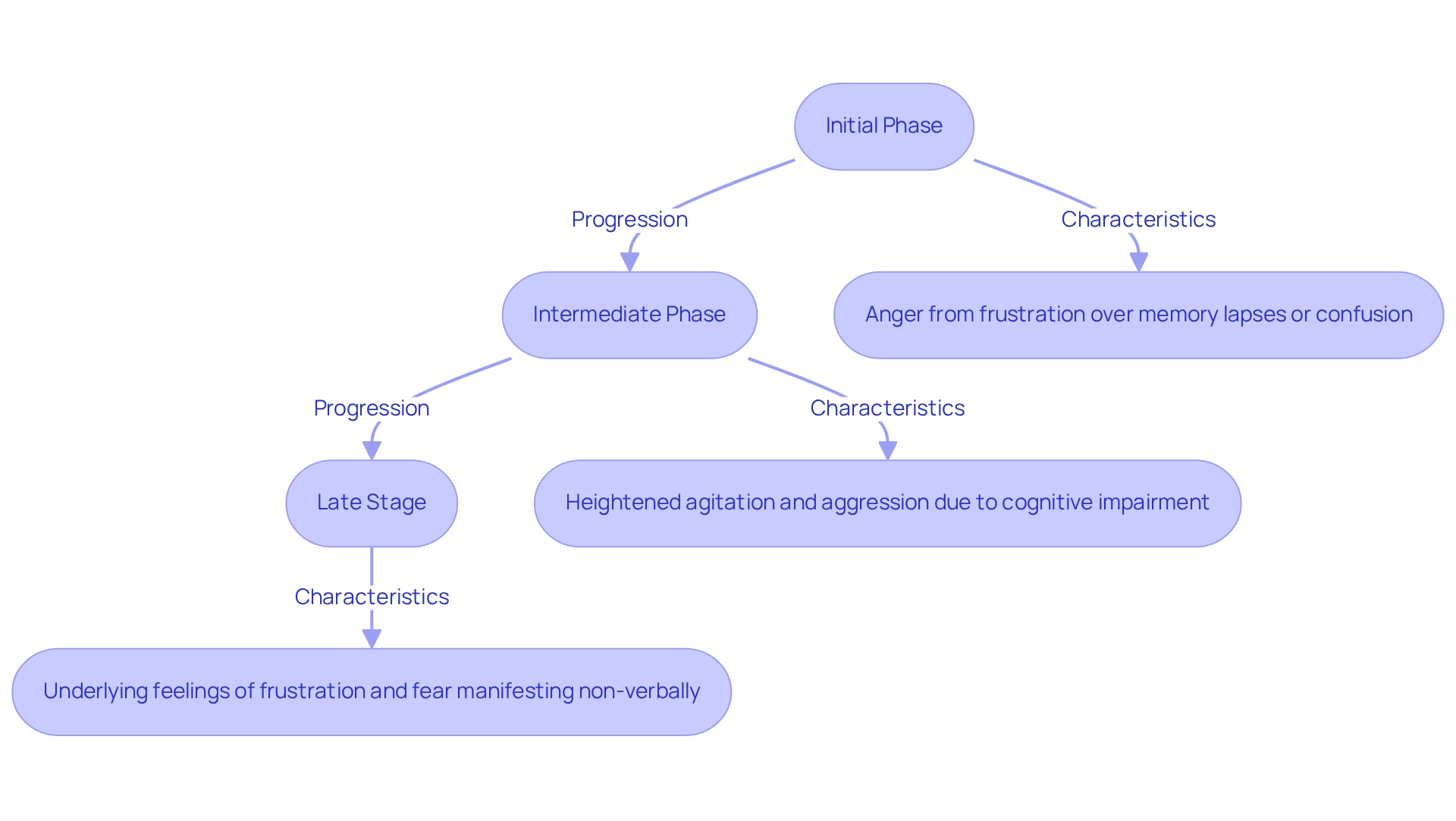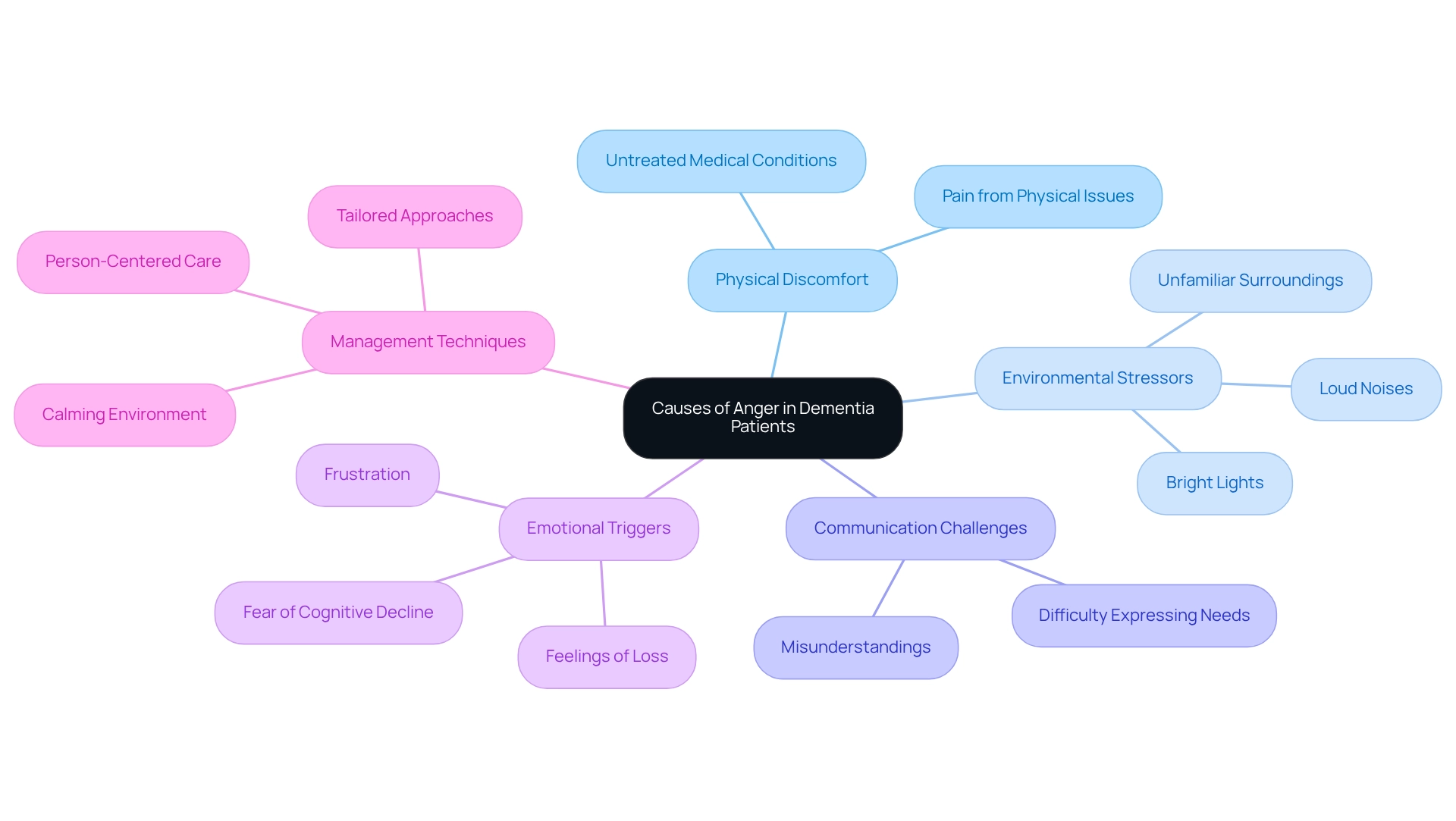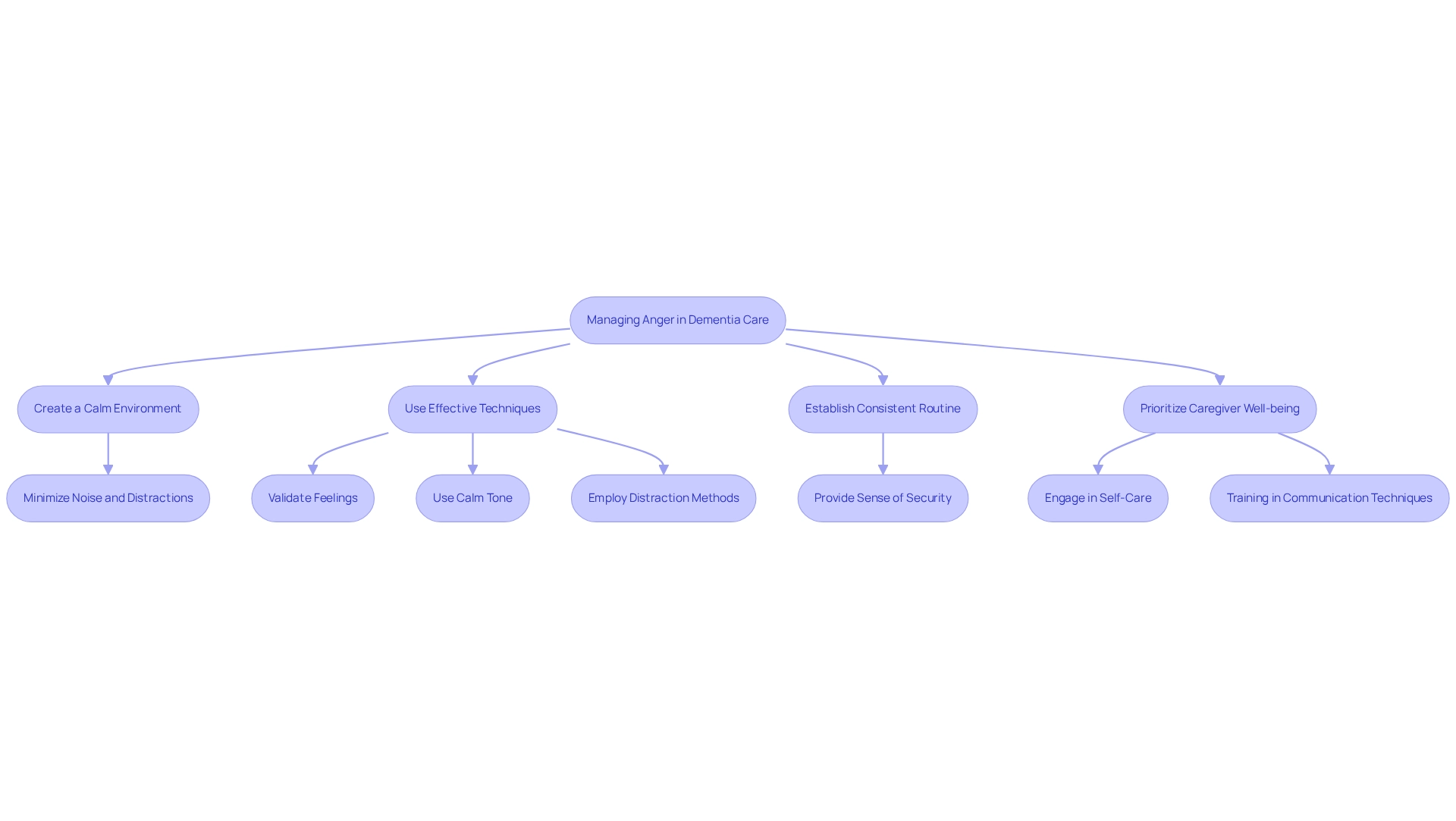Overview
Anger in dementia patients often surfaces during the middle stages of the disease, coinciding with heightened cognitive decline and communication challenges. Understanding this connection can be a pivotal step for caregivers. By recognizing the link between anger and the stages of dementia, caregivers can develop tailored strategies that create a nurturing environment. This approach not only alleviates emotional distress but also enhances the overall care experience for both patients and their families.
We understand how challenging it can be to navigate these emotions. In addition, implementing supportive strategies can make a significant difference in the lives of those affected. We’re here for you, ready to help you foster a sense of comfort and security for your loved ones. Your comfort is our priority, and together, we can work towards a more compassionate care journey.
Introduction
Dementia is a complex and multifaceted condition that affects millions of individuals and their families worldwide. Projections indicate a significant rise in new cases in the coming years, which can understandably cause concern. As cognitive decline progresses through its various stages—early, middle, and late—it’s crucial for caregivers to understand the emotional responses that may arise, particularly anger.
This article explores the intricate relationship between dementia and anger, delving into the triggers that can provoke such emotions. We aim to provide practical strategies for managing these feelings effectively. By equipping caregivers with knowledge and tools, we hope to enhance the quality of life for those affected by dementia.
Your comfort and care are our priorities, and through compassionate support, we can ensure that individuals with dementia receive the understanding and nurturing they deserve.
Define Dementia and Its Stages
Dementia is an overarching term that signifies a significant decline in cognitive function, impacting daily life. It encompasses various types, including Alzheimer’s disease, vascular cognitive impairment, and Lewy body syndrome. In 2025, it’s estimated that approximately 10 million new cases of dementia will be diagnosed globally each year. This statistic highlights the urgency of understanding this condition. Cheryl Hawkes emphasizes the importance of early intervention and healthier aging to potentially slow the progression of Alzheimer’s disease, underlining the necessity for awareness and proactive management of dementia.
Dementia typically progresses through three distinct phases: early, middle, and late. In the initial phase, individuals may experience slight memory loss and disorientation, often dismissed as typical aging. As the condition advances to the middle phase, many may wonder what stage of dementia is anger, as cognitive decline becomes more pronounced, leading to increased difficulties with communication, daily activities, and recognizing familiar faces. This phase can provoke frustration and emotional responses, leading to questions about what stage of dementia is anger, as individuals grapple with their declining abilities. It is crucial for families to create safe, judgment-free environments where those experiencing cognitive decline feel welcomed and accepted, as this can help alleviate emotional distress.
In the later phase of cognitive decline, individuals may lose the ability to respond to their surroundings, resulting in significant changes in behavior and emotional responses. This phase often requires comprehensive assistance and support, as individuals may become more dependent on caregivers for their daily needs. Without CNA/HHA services, seniors face considerable risks, including health deterioration due to lack of monitoring, poor nutrition from inadequate meal preparation, and increased social isolation, which can intensify feelings of loneliness and depression. Understanding these stages is vital for families and caregivers, as it allows them to anticipate changes and provide appropriate support, ultimately enhancing the quality of life for those affected by cognitive decline.
Best Care Nurses Registry, a leader in the home health care sector in South Florida, underscores the importance of professional support services for individuals with cognitive impairments. Our private duty RNs and LPNs deliver personalized care, ensuring that patients receive the emotional support and medical attention they need. This care is essential for maintaining their dignity and independence during this challenging journey. Additionally, our services offer a cost-effective and convenient alternative to traditional care settings, allowing families to focus on their loved ones’ well-being. We’re here for you, and your comfort is our priority.
Explore the Connection Between Anger and Dementia Stages
It is important for caregivers to understand what stage of dementia is anger, as it often correlates with the progression of the disease in dementia patients.
- In the initial phases, it is important to understand what stage of dementia is anger, as it may emerge from frustration over memory lapses or confusion.
- As the disease advances to the intermediate phase, patients may experience heightened agitation and aggression, leading to inquiries about what stage of dementia is anger, due to increased cognitive impairment and difficulty in communication.
- It’s important to recognize what stage of dementia is anger; in the late stage, while overt expressions of anger may diminish, underlying feelings of frustration and fear can still manifest in non-verbal ways.
By comprehending this connection, caregivers can provide suitable assistance and interventions, ensuring that every individual feels understood and supported.

Identify Causes of Anger in Dementia Patients
Understanding what stage of dementia is anger can help explain why it arises in dementia patients from various triggers, such as physical discomfort, environmental stressors, and communication challenges. For example, untreated medical conditions may lead to pain, while an unsuitable living environment can cause significant discomfort—both of which can result in frustration and anger. Environmental factors like bright lights and loud noises often worsen agitation, making it essential for caregivers to create a calming atmosphere.
Confusion from unfamiliar surroundings or disruptions in routine can provoke aggressive behaviors. Emotional triggers, including feelings of loss, fear, or frustration over cognitive decline, further complicate the situation. Understanding what stage of dementia is anger is crucial for caregivers, as it allows them to tailor their approach and foster a supportive environment that minimizes potential triggers.
At Best Care Nurses Registry, we recognize the importance of individualized care solutions that ensure the safety and well-being of your loved ones at home. Our support providers undergo a thorough screening process to guarantee their commitment to excellence. We work closely with families to develop personalized care plans that address specific needs. This assistance enables you to reconnect with your partner, children, and friends, providing peace of mind that your loved one is receiving skilled care.
Research indicates that understanding what stage of dementia is anger can help identify symptoms associated with cognitive decline, which may manifest as physical signs, including restless or weak legs, frequent urination, sweating, rapid or heightened heartbeat, shaking or trembling, and dizziness. By identifying these symptoms and their underlying causes, caregivers can implement effective management techniques, exploring various methods to determine what the individual tolerates best.
In critical situations, caregivers may need to call 911. It’s vital to inform responders that the individual has a cognitive impairment so they can respond appropriately. Case studies highlight the effectiveness of person-centered care methods, which focus on the individual preferences and backgrounds of patients with cognitive impairments. Such tailored approaches can significantly reduce behavioral issues and enhance the overall quality of care, as evidenced by improved outcomes in various implementations of these techniques.

Implement Strategies for Managing Anger in Dementia Care
Managing anger in individuals with cognitive impairment raises the question of what stage of dementia is anger, but there is hope. Caregivers play a crucial role in this journey, and creating a calm and familiar environment is essential. By minimizing noise and distractions, we can help foster a sense of peace. Techniques such as:
- Validating the patient’s feelings
- Using a calm tone
- Employing distraction methods
can effectively de-escalate tense situations.
Furthermore, establishing a consistent routine can provide a sense of security, reducing anxiety and potential anger triggers. This predictability is comforting not just for the individual but also for caregivers navigating these challenges. Remember, taking care of yourself is just as important; engaging in self-care can significantly impact your ability to provide quality care. Burnout among caregivers can adversely affect the support offered, so prioritizing your well-being is vital. Additionally, training in communication techniques specific to dementia can enhance caregivers’ ability to respond effectively to what stage of dementia is anger.
We’re here for you in this journey, and your comfort is our priority. Together, we can create a nurturing environment that addresses the needs of both caregivers and those they care for.

Conclusion
Understanding the complexities of dementia, particularly the emotional responses such as anger that can arise throughout its progression, is essential for effective caregiving. As dementia advances through its stages—early, middle, and late—individuals may experience varying degrees of cognitive decline, leading to frustration and emotional turmoil. Caregivers play a vital role in recognizing these emotions and implementing strategies to manage them, significantly improving the quality of life for those affected.
Identifying the triggers of anger in dementia patients is crucial. Factors such as physical discomfort, environmental stressors, and communication barriers can provoke these emotional responses. By creating a supportive and calming atmosphere, caregivers can help mitigate these triggers and foster a sense of security for their loved ones. Furthermore, employing person-centered care techniques tailored to the individual’s history and preferences can lead to better outcomes and a more positive caregiving experience.
Ultimately, the journey of caring for someone with dementia requires compassion, understanding, and a proactive approach. By equipping caregivers with the knowledge and tools to manage anger and emotional responses effectively, the overall well-being of both the patient and the caregiver can be enhanced. With the right support and resources, individuals living with dementia can receive the dignity and care they deserve, ensuring that their emotional needs are met throughout this challenging journey.
Frequently Asked Questions
What is dementia?
Dementia is an overarching term that signifies a significant decline in cognitive function, impacting daily life. It includes various types, such as Alzheimer’s disease, vascular cognitive impairment, and Lewy body syndrome.
How many new cases of dementia are expected to be diagnosed globally in 2025?
It is estimated that approximately 10 million new cases of dementia will be diagnosed globally each year in 2025.
Why is early intervention important in dementia care?
Early intervention is crucial as it can potentially slow the progression of Alzheimer’s disease and emphasizes the necessity for awareness and proactive management of dementia.
What are the three phases of dementia?
The three phases of dementia are early, middle, and late. Each phase presents different challenges and levels of cognitive decline.
What symptoms are experienced in the early phase of dementia?
In the early phase, individuals may experience slight memory loss and disorientation, which are often dismissed as typical aging.
What challenges arise in the middle phase of dementia?
In the middle phase, cognitive decline becomes more pronounced, leading to increased difficulties with communication, daily activities, and recognizing familiar faces, which can provoke frustration and emotional responses.
How can families support individuals in the middle phase of dementia?
Families can create safe, judgment-free environments where individuals experiencing cognitive decline feel welcomed and accepted, helping to alleviate emotional distress.
What happens in the later phase of dementia?
In the later phase, individuals may lose the ability to respond to their surroundings, resulting in significant changes in behavior and emotional responses, often requiring comprehensive assistance and support from caregivers.
What risks do seniors face without proper care services?
Seniors without proper care services may face health deterioration due to lack of monitoring, poor nutrition from inadequate meal preparation, and increased social isolation, which can intensify feelings of loneliness and depression.
What role does Best Care Nurses Registry play in dementia care?
Best Care Nurses Registry provides professional support services for individuals with cognitive impairments, offering personalized care through private duty RNs and LPNs to ensure patients receive the emotional support and medical attention they need.











